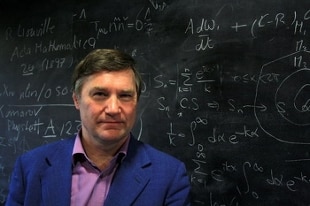Share
September 27, 2020The British astrophysicist, cosmologist and mathematician John David Barrow, original and influential scholar of the concept of infinity, of the Theory of everything, of the destiny of the Universe and its origin and of the particular numerical human life, he died last night at his home in Cambridge at the age of 67 from cancer.
The announcement of the disappearance via Twitter was made today by Professor Martin Rees, professor emeritus of astronomy at the University of Cambridge and Royal Astronomer.
Last February Barrow was appointed by Pope Francis as an ordinary member of the Pontifical Academy of Sciences.
Professor of Mathematical Sciences in Cambridge University's Department of Applied Mathematics and Theoretical Physics, Barrow is internationally renowned for his book "The Anthropic Principle" (Adelphi, 2002; original edition 1986) written with Frank J. Tipler.
Here he illustrates one of the most daring hypotheses - so much so as to provoke a very high number of disputes and surprising adhesions - on the problem of man's position in the Universe.
Barrow was also director of the Millennium Mathematics Project, a program to enhance appreciation of mathematical sciences and their applications.
He has received numerous awards, including the Templeton Prize in 2006, the Faraday Prize of the Royal Society in 2008. He is the author of about twenty books, translated into 29 languages, in which he explores many aspects of the main historical, philosophical and cultural implications of astronomy, physics and mathematics: among them stand out "The left hand of creation" (with Joseph Silk, Mondadori, 1985);
"The world within the world" (Adelphi, 1991);
"Theories of everything" (Adelphi, 1992);
"The moon in the cosmic well" (Adelphi, 1994);
"Why is the world mathematical?"
(Laterza 1992);
"The origins of the Universe" (Rizzoli, 2001);
"The universe as a work of art" (Rizzoli, 1997);
"Impossibility. Limits of Science and the Science of Limits" (Rizzoli, 1998);
"From the ego to the cosmos. Science, art, philosophy" (Raffaello Cortina, 2000);
"From zero to infinity, the great story of nothing" (Mondadori, 2002);
"The numbers of the universe" (Mondadori, 2003);
"The infinite" (Mondadori, 2005);
"The images of science. Five thousand years of discoveries: a visual history" (Mondadori, 2009);
"100 essential things you didn't know you didn't know" (Mondadori, 2011);
"The book of universes" (Mondadori, 2012);
"100 things you didn't know you didn't know about mathematics and the arts" (Mondadori, 2016).
Born in London on November 29, 1952, Barrow graduated with a BA in Mathematics from Durham University in 1974 and a PhD in Astrophysics from Oxford University in 1977. He taught at Oxford University and California University at Berkeley before earning a degree in 1981. placed at the Astronomy Center of the University of Sussex, where, until 1999, he was professor of astronomy and director of the Center for Astronomy.
He then became Professor of Mathematical Sciences in the Department of Applied Mathematics and Theoretical Physics at the University of Cambridge.
His research concerns the shape and levels of irregularity and topology of the universe, particle physics and cosmology, the origins of light elements, the possible origin and end of the Universe, the general solutions of Einstein's equations and theories gravitational forces of high order, the nature of the fundamental constants of physics and the introduction of new ways of using astronomy to investigate their invariance over time.
With his fundamental work "The anthropic principle", Barrow argues that everything revolves around an unavoidable nucleus: if extraordinary coincidences in the form of physical laws and in the values of the constants of nature, biochemistry, life and intelligent life do not occur would not be possible.
Not only would a generic universe taken at random would not allow life, but common astronomical objects and ordinary matter, in particular the carbon core, would not be possible either.
Starting from such an observation it is easy to reach the conclusion that there is a need, and the weak anthropic principle, which stops at the recognition of the facts, evolves into the strong one: since the world is like this, then it must be done like this.
Author of 300 publications on cosmology and astrophysics, Barrow has earned awards such as the Locker Prize for Astronomy, the Kelvin Medal of the Royal Glasgow Philosophical Society and several honorary degrees.
Internationally renowned lecturer, he has participated, not only in the United Kingdom, in important scientific conferences such as the Gifford Lectures, the George Darwin Lecture of the Royal Astronomical Society, the Amnesty International Lecture on Science in Oxford, The Flamsteed Lecture, The Tyndall Lecture , The Rsa Christmas Lecture for Children and the Spinoza Lecture at the University of Amsterdam.
John Barrow also has the singular merit of having held meetings on the subject of cosmology at the Venice Film Festival, at the British Prime Minister's residence in Downing Street, at Windsor Castle and in the Vatican.

